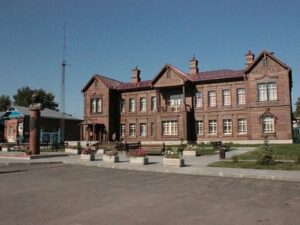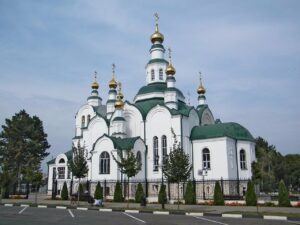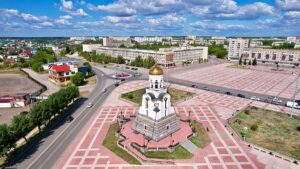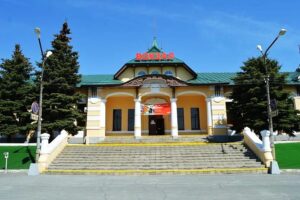Vologda, Russia: An In-Depth Exploration of Its History, Culture, and Modern Development

Introduction
Vologda, a city rich in history and culture, is one of the most notable cities in the northwest of Russia. Located on the banks of the Vologda River, this city serves as the administrative center of the Vologda Oblast. Known for its historical architecture, thriving cultural scene, and significant economic contributions, Vologda offers a unique blend of the past and present. This article delves into the various aspects of Vologda, from its historical roots and cultural heritage to its modern-day developments and lifestyle.
Historical Background
Early History and Foundation
The history of Vologda dates back to the 12th century, with its first mention in 1147. It is believed that the city was founded by Saint Gerasimus, a monk from the Rostov Monastery. Initially, Vologda served as a trading post and a defensive outpost. Its strategic location on the Vologda River, which connects to the Volga and the Northern Dvina, made it an important point for trade and transportation.
Growth and Development
In the 15th century, Vologda became part of the Grand Duchy of Moscow. Under the reign of Ivan III, the city began to flourish as a major center for trade and craftsmanship. The construction of the Vologda Kremlin, also known as the Vologda Fort, started during this period. The Kremlin served as both a defensive structure and a symbol of the city’s growing importance.
The Reign of Ivan the Terrible
The most significant period in Vologda’s history occurred during the reign of Ivan IV (Ivan the Terrible). In the mid-16th century, Ivan IV envisioned Vologda as a potential capital of Russia. He initiated the construction of the Saint Sophia Cathedral, modeled after the Saint Sophia Cathedral in Novgorod. Although Ivan IV’s plans to make Vologda the capital never materialized, his contributions significantly influenced the city’s architectural and cultural landscape.
The 18th and 19th Centuries
During the 18th century, Vologda continued to develop as an important trade center, particularly with the establishment of the Baltic-White Sea Canal. This canal linked the city to the Baltic Sea, enhancing its strategic importance. The 19th century saw further growth with the advent of the railway, connecting Vologda to major Russian cities such as Moscow and Saint Petersburg.
Soviet Era
The Soviet era brought industrialization and modernization to Vologda. The city saw the establishment of numerous factories and industrial enterprises. Despite the economic transformations, Vologda managed to preserve much of its historical architecture and cultural heritage. The Soviet period also saw the expansion of educational and cultural institutions, further enriching the city’s social fabric.
Post-Soviet Transformation
The dissolution of the Soviet Union in 1991 marked the beginning of a new chapter for Vologda. The city faced the challenges of transitioning to a market economy while preserving its historical and cultural identity. Despite economic difficulties, Vologda emerged as a vibrant city with a diverse economy, a thriving cultural scene, and a commitment to preserving its rich heritage.
Cultural Heritage
Architectural Highlights
Vologda is renowned for its well-preserved historical architecture. The city boasts numerous churches, monasteries, and wooden houses that reflect its rich architectural heritage. Some of the most notable architectural highlights include:
- Saint Sophia Cathedral: This iconic cathedral, built in the 16th century, is a masterpiece of Russian medieval architecture. Its massive white stone walls, elegant domes, and intricate frescoes make it a symbol of Vologda’s historical and cultural significance.
- Vologda Kremlin: The Vologda Kremlin, with its towering walls and imposing gates, is a testament to the city’s strategic importance. Although much of the original Kremlin has not survived, the remaining structures provide a glimpse into Vologda’s past.
- Church of the Intercession on the Nerl: This beautiful church, located near the Vologda River, is known for its stunning wooden architecture. It is one of the best examples of the traditional wooden churches of the Russian North.
- Spaso-Prilutsky Monastery: Founded in the 14th century, this monastery is one of the oldest and most significant religious institutions in the region. Its impressive architecture and serene surroundings make it a popular destination for both pilgrims and tourists.
Museums and Cultural Institutions
Vologda is home to a wealth of museums and cultural institutions that celebrate its rich history and cultural heritage. Some of the most prominent include:
- Vologda State Historical, Architectural, and Art Museum-Reserve: This extensive museum complex includes multiple sites and exhibits that cover various aspects of Vologda’s history, art, and architecture. The museum’s collections range from ancient artifacts to contemporary artworks.
- Lace Museum: Vologda is famous for its lace-making tradition, and the Lace Museum showcases this intricate craft. The museum’s exhibits include historical lace samples, tools, and demonstrations of lace-making techniques.
- Vasily Vereshchagin Art Gallery: Named after the renowned Russian painter Vasily Vereshchagin, this art gallery features a diverse collection of Russian and European art. The gallery regularly hosts exhibitions, workshops, and cultural events.
Festivals and Traditions
Vologda is a city that celebrates its cultural heritage through various festivals and traditions. Some of the most notable events include:
- Vologda Lace Festival: This annual festival celebrates the city’s famous lace-making tradition. The event features lace exhibitions, workshops, and competitions, attracting lace-makers and enthusiasts from around the world.
- Vologda Literary Festival: This literary festival honors the city’s literary heritage and promotes contemporary literature. The event includes readings, discussions, and book fairs, providing a platform for writers and readers to connect.
- Maslenitsa: This traditional Russian festival, also known as Pancake Week, is celebrated with great enthusiasm in Vologda. The festival marks the end of winter and includes various festivities such as pancake feasts, folk performances, and outdoor games.
Economic Landscape
Industrial Base
Vologda’s economy is diverse, with a strong industrial base that includes manufacturing, metallurgy, and food processing. Key industries in the city include:
- Mechanical Engineering: Vologda is home to several large mechanical engineering enterprises that produce machinery and equipment for various industries. These companies play a crucial role in the city’s economy and provide employment to a significant portion of the population.
- Food Processing: The city’s food processing industry is well-developed, with companies producing a wide range of products including dairy, meat, and confectionery. Vologda butter, known for its high quality, is particularly famous and is a significant export product.
- Woodworking: Given its location in the Russian North, Vologda has a robust woodworking industry. The city produces a variety of wood products, including furniture, building materials, and paper.
Commerce and Services
In addition to its industrial base, Vologda has a growing commerce and services sector. The city’s retail landscape includes a mix of local markets, shopping centers, and international brand outlets. The service industry, including banking, healthcare, and education, has also expanded significantly, catering to the needs of the city’s population.
Agriculture
Agriculture plays an important role in Vologda’s economy, with the region known for its fertile soil and favorable climate. The city produces a variety of agricultural products, including grains, vegetables, and dairy. Local farmers also engage in animal husbandry, contributing to the region’s food supply.
Education and Research
Higher Education Institutions
Vologda is home to several higher education institutions that offer a wide range of academic programs. The Vologda State University is the leading university in the city, providing education in fields such as engineering, humanities, natural sciences, and social sciences. The university is known for its strong emphasis on research and collaboration with local industries.
Research and Development
Research and development (R&D) play a crucial role in Vologda’s industrial and technological advancement. The city hosts various research institutes and laboratories focused on areas such as materials science, environmental studies, and agricultural research. Collaborative projects between industry and academia drive innovation and technological progress, ensuring the city’s competitive edge in the global market.
Modern Lifestyle
Housing and Infrastructure
Vologda offers a diverse range of housing options, from historical wooden houses to modern apartment complexes. The city’s infrastructure is well-developed, with an extensive network of roads, public transportation, and utilities. Efforts to modernize and improve urban infrastructure are ongoing, aiming to enhance the quality of life for residents.
Recreation and Leisure
Vologda boasts numerous recreational facilities and green spaces that provide residents with opportunities for leisure and outdoor activities. The city’s parks and gardens, such as the Kirov Park and the Park of Culture and Rest, offer scenic walking paths, playgrounds, and sports facilities. The Vologda River also provides opportunities for boating, fishing, and waterfront relaxation.
Dining and Entertainment
The culinary scene in Vologda is diverse, with a variety of restaurants, cafes, and eateries offering both traditional Russian cuisine and international dishes. The city’s dining establishments range from casual cafes to fine dining restaurants, catering to different tastes and preferences.
Entertainment options in Vologda include theaters, cinemas, and cultural centers that host a variety of performances, screenings, and events. The Vologda Drama Theater and the Vologda Regional Philharmonic are prominent venues for theatrical productions and musical performances, providing residents with access to high-quality cultural experiences.
Tourism and Attractions
Natural Beauty
The natural beauty of Vologda and its surroundings is one of the city’s key attractions. The Vologda River, with its scenic banks and picturesque views, is a major draw for tourists and nature enthusiasts. The region’s forests, lakes, and rivers offer opportunities for hiking, camping, and wildlife observation.
Historical and Cultural Sites
Vologda’s historical and cultural sites provide a glimpse into the city’s past and its development over the years. Some of the most notable landmarks include:
- Saint Sophia Cathedral: This iconic cathedral, with its impressive architecture and historical significance, is a must-visit landmark. Its frescoes and religious artifacts offer insight into Vologda’s spiritual heritage.
- Vologda Kremlin: The Kremlin’s remaining structures, such as the Saint Sophia Bell Tower and the Vologda Kremlin Palace, provide a fascinating look into the city’s defensive and administrative history.
- Museum of Architecture and Ethnography: This open-air museum, located on the outskirts of Vologda, showcases traditional wooden architecture and cultural artifacts from the Russian North. The museum offers visitors a chance to experience rural life and customs from different historical periods.
Adventure and Eco-Tourism
For adventure seekers and eco-tourists, Vologda offers various outdoor activities and experiences. The region’s natural landscapes provide ample opportunities for hiking, birdwatching, and exploring the rich biodiversity of the Russian North. Eco-tourism initiatives aim to promote sustainable tourism while preserving the natural environment.
Challenges and Future Prospects
Economic Diversification
While Vologda’s economy has traditionally been dominated by heavy industry and manufacturing, efforts are being made to diversify the economic base. This includes promoting sectors such as information technology, tourism, and services. Economic diversification is seen as crucial for the city’s long-term stability and growth.
Environmental Sustainability
As an industrial city, Vologda faces environmental challenges related to pollution and resource management. Initiatives to promote environmental sustainability include improving waste management, reducing industrial emissions, and conserving natural resources. These efforts aim to balance economic development with environmental protection.
Urban Development
Urban development and modernization are ongoing priorities for Vologda. This includes upgrading infrastructure, enhancing public services, and improving the overall urban environment. The city’s development plans focus on creating a livable and attractive urban space that meets the needs of residents and visitors alike.
Conclusion
Vologda, with its rich history, cultural heritage, and modern vibrancy, is a city that embodies the spirit of resilience and renewal. From its ancient monastic origins to its role in shaping Russian trade and industry, Vologda has always been a place of significance. Today, it continues to thrive as a center of industry, education, and culture, offering a unique blend of the past and the present. Whether exploring its historical landmarks, delving into its artistic treasures, or experiencing its modern-day life, Vologda is a city that captivates and inspires.




